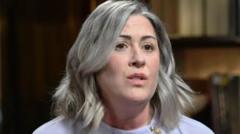After years of silence, Caroline Darian speaks out against her father, Dominique Pelicot, who was convicted for drugging and facilitating abuse against her mother. With a focus on chemical submission, she highlights the need for awareness and support for victims while navigating her own trauma as the daughter of both a predator and a survivor.
Daughter of Sexual Abuse Survivor Campaigns Against Chemical Submission

Daughter of Sexual Abuse Survivor Campaigns Against Chemical Submission
Caroline Darian confronts her father's horrific crimes and fights for awareness on the hidden issue of drug-facilitated sexual assault.
On a life-altering November evening in 2020, Caroline Darian received soul-crushing news from her mother, Gisèle Pelicot: her father, Dominique, had been drugging her for a decade, enabling countless men to sexually assault her. This revelation flipped Caroline's life upside down. “I shouted, I cried, I even insulted him. It was like an earthquake,” she recounted. Now, four years later, Caroline, 46, firmly believes her father "should die in prison," emphasizing his status as a dangerous man.
Dominique Pelicot was handed a 20-year sentence after a landmark trial that revealed his role in orchestrating the sexual abuse of his wife by over fifty men he recruited online. The investigation into his conduct began after he was caught upskirting in a supermarket. Authorities later uncovered thousands of shocking photos and videos on his devices, showcasing Gisèle being violated while unconscious.
This case brought significant attention to the issues of rape and domestic violence, particularly the insidious nature of chemical submission—where drugs are used to incapacitate victims. Caroline has dedicated her life to advocacy around this underreported topic, recognizing that many victims lack awareness of their assaults due to the effects of drugs.
In the aftermath of her father's crimes coming to light, Caroline penned a book titled "I'll Never Call Him Dad Again," wherein she documents the trauma endured by her family and delves deeper into the devastating issue of chemical submission. Caroline speculates that her father may have drugged her as well, a claim he vehemently denies. “I know that he drugged me, probably for sexual abuse. But I don’t have any evidence,” she confesses, highlighting the grim reality for numerous victims who often go unsupported due to a lack of tangible proof.
Caroline recalls the arduous days after her mother’s heart-wrenching revelations. United in their trauma, she, her mother, and her brothers traveled to the south of France for support. There, they confronted Dominique and the horrendous legacy of his actions. When shown evidence of her own victimization during police investigations, Caroline experienced a disorienting wave of emotion and self-doubt. “I lived a dissociation effect. I had difficulties recognizing myself,” she recalls.
Struggling with the knowledge that her father was not just a perpetrator to her mother, but potentially to her as well, Caroline remains resolute in her mission: raise awareness around chemical submission and advocate for invisible victims across society. Sharing their story, Gisèle and Caroline aimed to confront public complacency around such issues while navigating their complex relationship as both survivor and unwitting daughter of a sex offender.
Now burdened by the mix of grief and anger, Caroline emphasizes her father's culpability, asserting, “He is a dangerous man. There is no way he can get out.” As Dominique serves his sentence, Caroline and her family work to heal from this trauma. Gisèle is reportedly making strides in her recovery, while Caroline draws strength from her close-knit family, including her husband and son.
Despite the shadows of their past, Caroline is determined to build a life centered on education and support for others. “The events that were unleashed on that November day made her who she is today,” Caroline reflects, fully aware of the long journey ahead to raise awareness about drug-facilitated assaults and provide a voice for those who might otherwise remain unheard.



















